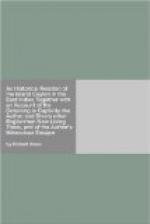[The King poysons his Son to prevent a Rebellion hereafter.] The King could but not be sensible, that it was his rigorous government that had occasioned this Rebellion, yet amended it not in the least; but on the contrary like to Rehoboam added yet more to the Peoples yoak. And being thus safely re-instated in his Kingdom again, and observing that the life of his Son gave encouragement to the Rebellion, resolved to prevent it for the future by taking him away. Which upon the next opportunity he did by Poysoning him, which I have related before.
[His ingratitude.] But one thing there is, that argues him guilty of imprudence and horrible ingratitude, that most of those that went along with him when he fled, of whose Loyalty he had such ample experience, he hath since cut off; and that with extreme cruelty too.
[Another Comet, but without any bad effects following it.] In the year 1666 in the month of February, there appeared in this Countrey another Comet or stream in the West, the head end under the Horizon, much resembling that which was seen in England in the year 1680 in December. The sight of this did much daunt both King and People, having but a year or two before felt the sad event of a Blazing-Star in this Rebellion which I have now related. The King sent men upon the highest mountains in the Land to look if they could perceive the head of it, which they could not, being still under the Horizon. This continued visible about the space of one month, and by that time it was so diminished, that it could not be seen. But there were no remarkable passages that ensued upon it.
PART III.
CHAP. I.
Concerning the Inhabitants of this Island.
Wee shall in this Part speak of the Inhabitants of this Countrey, with their Religion, and Customs, and other things belonging to them.
[The several Inhabitants of this Island.] Besides the Dutch who possess, as I judg, about one fourth of the Island, there are Malabars, that are free Denizons and pay duty to the King for the Land they enjoy, as the Kings natural Subjects do; there are also Moors, who are like Strangers, and hold no Land, but live by carrying goods to the Sea-Ports, which now are in the Hollanders hands. The Sea-Ports are inhabited by a mixt people, Malabars and Moors, and some that are black, who profess themselves Roman Catholicks, and wear Crosses, and use Beads. Some of these are under the Hollander; and pay toll and tribute to them.
But I am to speak only of the natural proper People of the Island, which they call Chingulays.




